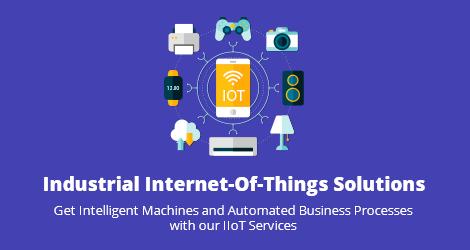Automation of various daily activities is not a new concept. It is something we see and do in our everyday lives. We use the products that are born out of the internet of things. It’s in our smartwatches, home hubs, weighing scales, refrigerators, doorbells, our cars, and a million other products in between. The internet in them enables them to talk to each other. However, IoT goes beyond just our personal use products. It has expanded its reach to machines, factories and what not.
This is the industrial internet of things. It is popularly known as the fourth wave of the Industrial Revolution.
And in this blog, we are going to give you an overview of how it works, how it enhances your business operations and the challenges you might face during the implementation of the same.
How does IIoT work?
The most basic step of using IIoT solutions in your production flow is by integrating the necessary sensors or by switching out with the machines that have with the right sensors. There are two ways to go about it. Either one can build these machines from scratch according to one’s requirement, or one can buy these machines and robots and program them according to their needs.
The sensors you use can be determined by how you want the actions to flow. For movement-based actions, you need a motion sensor, for time-based ones you need to set it up for actions at specific intervals. You can also have temperature-based sensors to get the most productivity based on the changing environment.
IIoT might come with some complications but it has something big to offer us. According to a study, by 2020, 85% of manufacturers plan to implement IIoT solutions in their plants.
This means that they can see the long-term implementation of IIoT and already have a workforce that knows how to use these systems or are in the process of hiring skilled people who are able to integrate IIoT in their workflow.
And if you are still on the minority side of this, then we know the reason why. In our next section, we have listed out the concerns you might have regarding IIoT and of course, the reasons why you should let go of them.
Why are owners scared of implementing industrial IoT services?
- Data security breaches: The most important part of the internet of things, is the cloud-based system it works on. The data is on a cloud platform. A lot of owners worry about security breaches.
- Finding skilled workforce: IIoT is a fairly new concept. So, owners are concerned about not being able to find skilled workers for a price that they can afford.
- Upgrading costs: Upgrading huge machines is pretty expensive. And without actually seeing the benefits work for them, the owners are hesitant to take the risk of spending a huge sum of money.
- Production Stoppage: Obviously upgrading machines means production will pause for a while. This means your business might suffer a loss during the process of machine upgradation.
- Current Workforce Problems: The staff may take a while to learn their way around the new machines, so the once friction-less work environment could be a little more stressful. This may upset the workflow and affect the production process. However, once the training is over and things start to run smoothly, there is no turning back on efficiency.
All the concerns regarding the IIoT are valid but the benefits IIoT has to offer will take your business to another level. Below are the benefits of IIoT:
Reasons Why You Should Future Proof Your Business with Industrial IoT:
Industrial Internet of Things connects the machines in your factory with the internet. The machines can monitor themselves and learn their own behavior patterns making sure that everything works efficiently.
- Seamless Workflow: IIoT enabled devices work with each other to create a seamless workflow. This gives way to more structured business operations and quality products. IIoT solutions make your machines smarter and help you sell more.
- Shorter Maintenance Time: The machines work in sync with each other and humans in a particular pattern. Any break in the pattern triggers an alert and notifies the owner. This means that one can repair it immediately. When the maintenance interval is shorter, the production cycle has shorter delays.
- Efficient Customer Service: Another advancement that IIoT can offer you is the efficient monitoring of all the products you sell. Whenever the products malfunction, your customer immediately gets an alert to bring it in for maintenance or you can offer at home maintenance, depending on the product. Efficient customer service helps establish a long-term relationship with the customer.
- Enhanced Upselling: As we have already established, IIoT solutions can monitor the products that an owner sells. It is a great way to upsell your original product. Moreover, by learning how customers use a product, and what for, the owner can understand the future requirements of the market and launch new products based on that. The new products can be completely unrelated to the original one, or they could be add-on accessories that enhance the original product.
All the benefits mentioned above have made the manufacturers believe in the Industrial Internet of Things.













No Comments